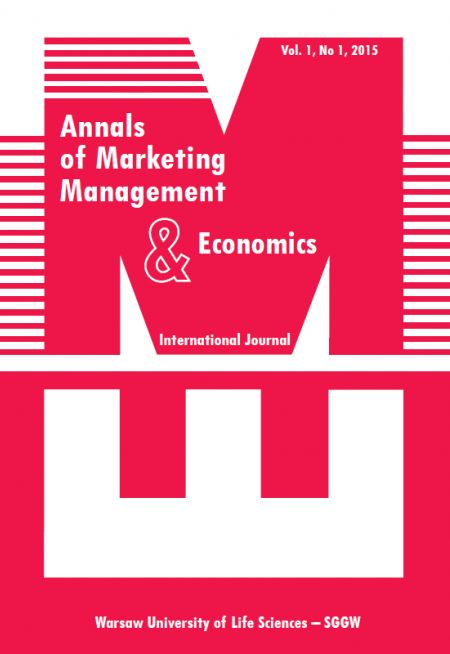Main Article Content
Article Details
Bober B., 2013. Methods of analysis and evaluating risk-management decision-making process of the provision of services in public hospitals, School of Banking in Poznan, Poznań.
Cardona D., 2006. Pharmacological therapy of cancer anorexia-cachexia, Nutricion Hospitalaria 21 (suppl. 3), 17-26.
Cieślik E., Stachura M., Topolska K., 2010. The quality of catering services in the opinion of consumers, Bromatology and Toxicological Chemistry 4.
Commission Regulation (EC) 1441/2007 of 5 December 2007 amending Regulation (EC) 2073/2005 on microbiological criteria for foodstuffs.
Czarniecka-Skubina E., Janicki A., 2009. Labelling food products. Nutritional and health information, Food Industry 1, 34-37.
European Parliament and Council Directive 2003/99/EC on the monitoring of zoonoses and zoonotic agents, amending Council Decision 90/424/EEC and repealing Council Directive 92/117/EEC.
Food Safety and Nutrition Act of 25 August 2006, Journal of Laws 2006 No 171, item 1225.
Goldfinch B., 2010. Nutritional support, Practical Medicine, 99-103.
Grębowiec M., 2010. Factors determining quality and their influence on purchasing decisions in the catering market, Economics and Organization of the Food Economy 80, 117-130.
Jarosz M., Respondek W., 2006. Socio-economic costs of diet-related diseases, II Conventi on probiotic "Probiotics in prevention and treatment" 11, 21-22
Jasiulewicz-Kaczmarek M., Wieczorek R., 2008. Exploitation of food safety management system subject to customer satisfaction, (in:) Concepts of quality management. Experiences and perspectives, (ed.) T. Sikora, PTTĩ Publishing House, Kraków, 617.
Kowalczyk S. (ed.), 2009. Food safety in the era of globalization, Warsaw School of Economics Press, Warszawa.
Kowalska A., 2010. Quality and competitiveness in organic farming, Difin, Warszawa.
Leba S., 2008. Consumer quality as a challenge for food producers, (in:) Concepts of quality management. Experiences and perspectives, (ed.) T. Sikora, Scientific PTTĩ, Kraków, 631.
Markovic S., Raspor S., Śegaric K., 2010. Does restaurant performance meet customers' expectations? An assessment of restaurant service quality using a modified Dineserv approach, Tourism and Hospitality Management 16, 2, 181. (Crossref)
Olkiewicz M., 2012a. Evaluation of the operation effects of a quality management system in an enterprise, Management and Finance. Journal of Management and Finance 10, 3, Part 1, 203-206.
Olkiewicz M., 2012b. Functioning of the integrated management system in an organization, (in:) Qualitative aspects of management integration, (ed.) E. Fiddler, University of Lublin, Lublin, 79-80.
Ordinance of Minister of Health, dated 6 November 2012, on guaranteed benefits in the field of hospital treatment, Journal of Laws of 2012 No 140, item 1316.
Ordinance of Minister of Health, dated 15 September 2011, on guaranteed benefits in the field of hospital treatment, Journal of Laws of 2011 No 202, item 1191.
Piśkula M., Strączkowski M., 2011. Characteristics of factors determining consumer safety and health-related quality of food, Polish Journal of Agronomy 7, 82-91.
Sicherer S.H., Sampson H.A. (ed.), 2010. Food Allergy, Journal of Allergy Clinical Immunology 125 (2), 116-125. (Crossref)
Sobotka L. (ed.), 2007. Fundamentals of Clinical Nutrition, Polish Medical PZWL, Warszawa.
Szymanski A., 2014. Diet and nutrition, WSKFiT, Scientific Papers 9, 11-18.
Tile P., SIKORA T., 2013. Use of methods and tools of quality management in food manufacturing, Food. Science. Technology. Quality 1 (86), 204-216.
Turlejska H., 2007. Traders' responsibility for safer products, Przegląd Zbożowo- Młynarski 10, 2-3.
WHO, 2008. 2008-2013 Action Plan for the Global Strategy for the Prevention and Control of Non-communicable Diseases.
Downloads

Utwór dostępny jest na licencji Creative Commons Uznanie autorstwa 4.0 Międzynarodowe.





